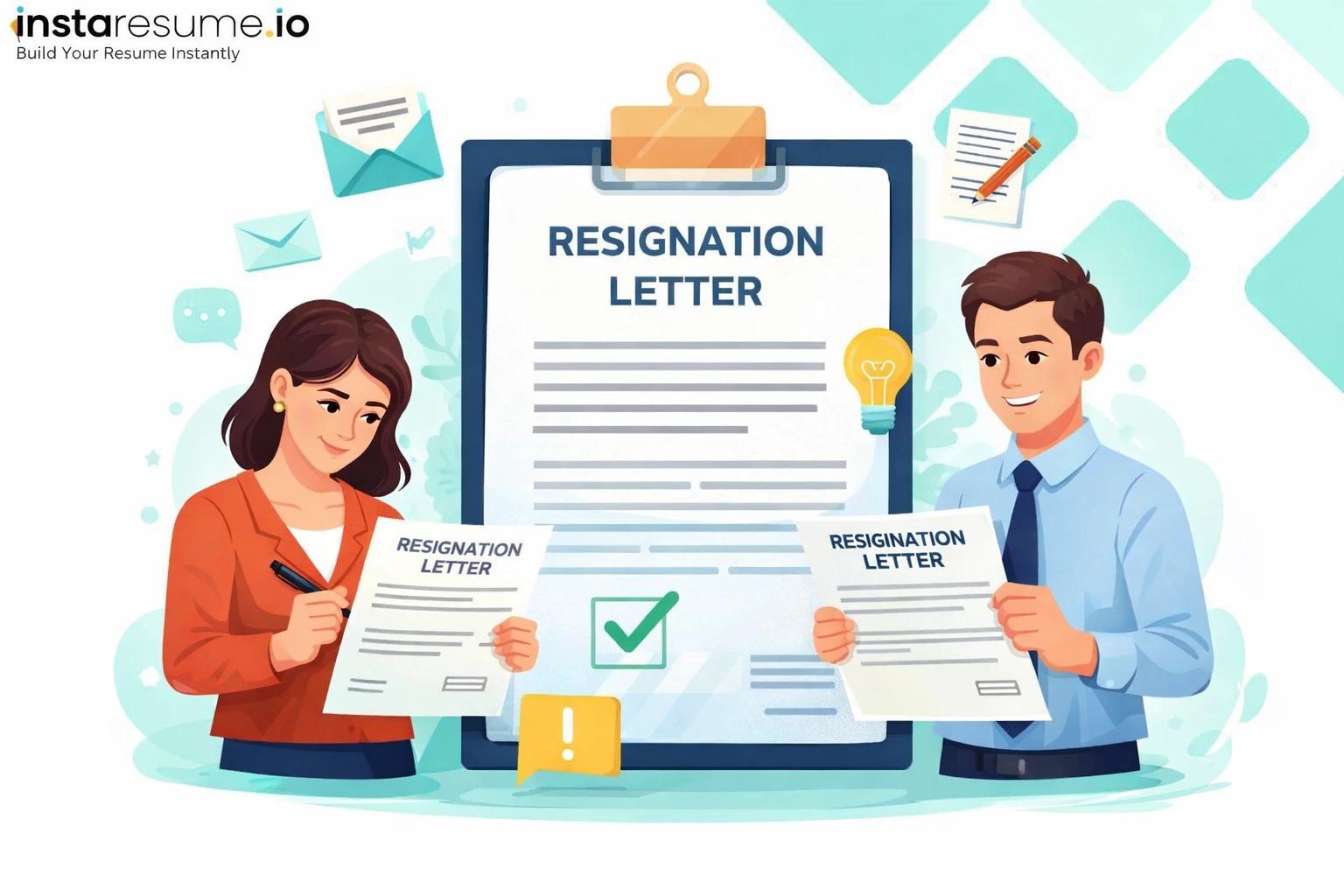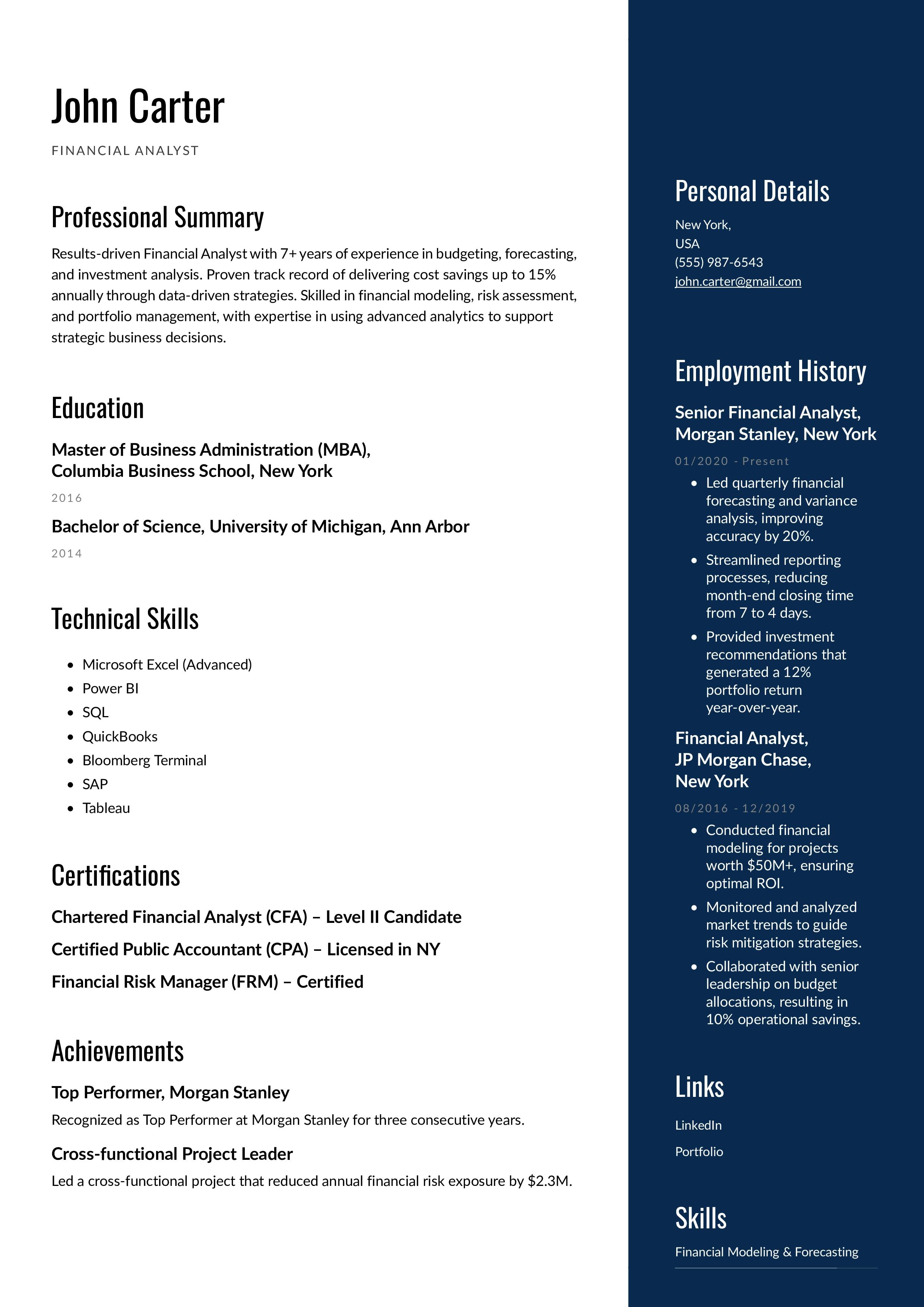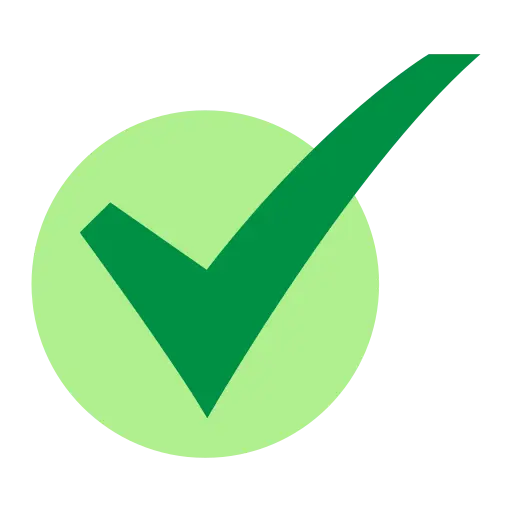Professional Resignation Letter Sample
Trust Score: 4.8
362 reviews

Table of Contents
Crafting a professional resignation letter is more than a formality it's your final communication with your employer and a lasting impression of your time with the organization. Whether you're resigning for a better opportunity, personal reasons, or career growth, knowing how to write a sample resignation letter can ensure you exit gracefully and on good terms.
In this guide, you'll learn how to write a simple, effective, and polished resignation letter with examples, writing tips, and a focus on tone, structure, and professionalism.
Sample Resignation Letter Templates
Here’s a sample resignation letter that you can customize based on your specific circumstances:
[Your Name]
[Your Address]
[City, State, ZIP Code]
[Email Address]
[Phone Number]
[Date]
[Manager’s Name]
[Company Name]
[Company Address]
[City, State, ZIP Code]
Subject: Resignation Letter
Dear [Manager’s Name],
I am writing to formally resign from my position as [Your Job Title] at [Company Name], effective [Last Working Day, e.g., August 20, 2025].
This has not been an easy decision, but after careful consideration, I have decided to pursue a new opportunity that aligns with my long-term career goals. I want to express my heartfelt thanks for the support, mentorship, and experiences I’ve gained during my time here.
Over the next [notice period duration], I am committed to ensuring a smooth transition. Please let me know how I can assist in training my replacement or documenting key responsibilities.
I truly appreciate the opportunity to have been a part of the team and wish the company continued success.
Sincerely,
[Your Name]
Mistake-free resignation letter for an IT professional
Subject: Resignation – [Your Full Name]
Dear [Manager’s Name],
Please accept this letter as formal notice of my resignation from my position as [Your Job Title] at [Company Name]. My last working day will be [Date], in accordance with the notice period outlined in my employment contract.
I would like to sincerely thank you and the entire team for the opportunities, support, and technical exposure I have received during my time here. Working at [Company Name] has helped me grow both professionally and personally, and I truly appreciate the collaborative environment and learning culture.
Over the next few weeks, I will ensure that all my responsibilities, projects, and documentation are properly handed over. I am happy to assist in training my replacement or supporting the team to ensure a smooth transition.
Thank you again for the guidance and experience. I wish the organization continued success in the future.
Yours sincerely,
[Your Full Name]
[Your Job Title]
[Your Employee ID, if required]
[Your Contact Information]
Software Engineer – Resignation Letter template
Subject: Resignation – Daniel Carter
Dear Ms. Robinson,
I am writing this letter to formally resign from my position as Software Engineer at BlueWave Technologies Inc. My last working day will be April 30, 2026, following the notice period mentioned in my contract.
When I joined BlueWave three years ago as a junior developer, I was excited but nervous. Over time, working on cloud migration projects and the customer portal system helped me grow into a confident and skilled software engineer. I truly appreciate the trust you and the team placed in me.
I have recently received an opportunity that aligns closely with my long-term career goals, and after careful thought, I have decided to move forward with it. This decision was not easy because I have enjoyed working here and learning from such a supportive team.
Over the next few weeks, I will complete my current tasks, update all technical documentation, and help with the handover of my projects to ensure everything continues smoothly.
Thank you for your guidance, encouragement, and leadership. I am grateful for the experience I gained at BlueWave Technologies and will always look back on this time positively.
Warm regards,
Daniel Carter
Software Engineer
BlueWave Technologies Inc.
[email protected]
Data Analyst – Resignation Letter Template
Subject: Resignation – Emily Watson
Dear Mr. Reynolds,
I am writing to formally resign from my position as Data Analyst at InsightCore Solutions Ltd. My last working day will be May 15, 2026, in line with my notice period.
When I joined InsightCore two years ago, I was excited to work with real business data and help teams make better decisions. From building sales dashboards to analyzing customer trends, every project taught me something new. I truly appreciate the support and guidance I received from you and the analytics team.
After careful consideration, I have decided to accept a new opportunity that better matches my long-term career goals. This was not an easy decision, as I have enjoyed being part of such a collaborative and professional workplace.
Over the coming weeks, I will complete my ongoing reports, document my analysis processes, and ensure a smooth handover of all responsibilities.
Thank you for trusting me with important data and giving me the chance to grow as a data analyst. I will always value my time at InsightCore.
Kind regards,
Emily Watson
Data Analyst
InsightCore Solutions Ltd.
[email protected]
School Teacher – Resignation Letter Template
Subject: Resignation – Laura Bennett
Dear Mr. Thompson,
I am writing to formally resign from my position as English Teacher at Riverside International School. My last working day will be June 10, 2026, as per the notice period.
When I joined Riverside five years ago, I was excited to step into a classroom filled with curious young minds. Over the years, teaching literature, guiding students, and watching them grow has been one of the most meaningful experiences of my life. I am truly grateful for the support I received from the school leadership and my fellow teachers.
After much thought, I have decided to take a new step in my career that will allow me to continue growing both professionally and personally. This decision was not easy, as Riverside has been like a second home to me.
Before my departure, I will complete the syllabus, prepare lesson plans, and hand over all academic records to ensure a smooth transition for my students.
Thank you for trusting me with the responsibility of shaping young minds. I will always look back on my time at Riverside with pride and gratitude.
Warm regards,
Laura Bennett
English Teacher
Riverside International School
[email protected]
College Professor – Resignation Letter Template
Subject: Resignation – Dr. Michael Anderson
Dear Dr. Lewis,
I am writing to formally resign from my position as Associate Professor of Economics at Westbridge University. My last working day will be July 15, 2026, as per the notice period stated in my contract.
When I joined Westbridge six years ago, I came with a passion for teaching and research. Over the years, working with bright students, guiding thesis projects, and being part of academic discussions has been deeply rewarding. I truly appreciate the academic freedom and support that the university has given me.
After careful thought, I have decided to take up a new academic opportunity that aligns more closely with my long-term research goals. This was not an easy decision, as Westbridge has played an important role in my professional journey.
Before my departure, I will complete my current semester responsibilities, submit grades, and ensure all course materials and research records are properly handed over.
Thank you for your guidance and for creating such a positive academic environment. I will always be grateful for my time at Westbridge University.
Sincerely,
Dr. Michael Anderson
Associate Professor of Economics
Westbridge University
[email protected]
Hospital Receptionist – Resignation Letter Template
Subject: Resignation – Olivia Martinez
Dear Ms. Carter,
I am writing to formally resign from my position as Hospital Receptionist at Greenfield Medical Center. My last working day will be June 30, 2026, in accordance with my notice period.
When I joined Greenfield Medical Center three years ago, I was new to the healthcare environment but eager to help patients and their families. Over time, greeting visitors, managing appointments, and supporting the front desk team became a meaningful part of my daily work. I truly appreciated the friendly and supportive atmosphere of the hospital.
After careful consideration, I have decided to move on to a new opportunity that will allow me to continue growing professionally. This was not an easy decision, as I enjoyed working with such a caring and dedicated team.
Before my departure, I will ensure that all front-desk records, schedules, and patient information are properly handed over to make the transition smooth.
Thank you for trusting me with this important role. I will always value my time at Greenfield Medical Center.
Warm regards,
Olivia Martinez
Hospital Receptionist
Greenfield Medical Center
[email protected]
Nurse – Resignation Letter Template
Subject: Resignation – Sarah Williams
Dear Ms. Peterson,
I am writing to formally resign from my position as Registered Nurse at Hillside General Hospital. My last working day will be July 10, 2026, as per my notice period.
When I joined Hillside four years ago, I was proud to be part of a hospital that truly cared for its patients. From long night shifts to comforting families during difficult times, every day taught me something valuable. I am deeply thankful for the guidance and support I received from you and the nursing team.
After much thought, I have decided to take a new opportunity that will allow me to grow further in my nursing career. This decision was not easy, as Hillside has been an important part of my professional journey.
Before I leave, I will ensure all patient records, treatment notes, and shift responsibilities are properly handed over so that patient care continues without disruption.
Thank you for trusting me with the care of so many patients. I will always be grateful for my time at Hillside General Hospital.
Warm regards,
Sarah Williams
Registered Nurse
Hillside General Hospital
[email protected]
Free financial analyst resume template (ATS-friendly example)
Short and Simple Resignation Letter Example
If you’re pressed for time or prefer a minimalist style, here’s a one-paragraph example of a simple resignation letter:
Subject: Resignation – [Your Name]
Dear [Manager’s Name],
Please accept this letter as formal notice of my resignation from [Job Title] at [Company Name], effective [Last Working Day]. I appreciate the opportunities for professional growth and thank you for the support during my tenure. I will do my best to ensure a smooth transition.
Sincerely,
[Your Name]
Tips for Writing a Resignation Letter That Gets It Right
Learning how to write a sample resignation letter involves understanding the nuances of tone, timing, and structure. Follow these tips to avoid common pitfalls:
Do:
 Keep your tone polite and professional, regardless of your reason for leaving.
Keep your tone polite and professional, regardless of your reason for leaving. Submit your letter in writing (PDF format if via email).
Submit your letter in writing (PDF format if via email). Give at least two weeks’ notice, unless circumstances require immediate resignation.
Give at least two weeks’ notice, unless circumstances require immediate resignation. Personalize the letter without being too emotional or verbose.
Personalize the letter without being too emotional or verbose. Proofread for errors before sending it.
Proofread for errors before sending it.
Common mistakes and how to avoid them:
 Being overly emotional or critical: Keep it professional. This is not the place to air grievances.
Being overly emotional or critical: Keep it professional. This is not the place to air grievances. Failing to mention your notice period: Always clarify your intended last working day.
Failing to mention your notice period: Always clarify your intended last working day. Using a vague or unclear tone: Say exactly what you mean—avoid phrases like “might resign” or “thinking of leaving.”
Using a vague or unclear tone: Say exactly what you mean—avoid phrases like “might resign” or “thinking of leaving.” Skipping gratitude: Even if your experience wasn’t perfect, showing appreciation reflects maturity.
Skipping gratitude: Even if your experience wasn’t perfect, showing appreciation reflects maturity. Ignoring formatting and structure: Use a business letter format with aligned text, dates, and spacing.
Ignoring formatting and structure: Use a business letter format with aligned text, dates, and spacing.
Frequently Asked Questions (FAQs) – Resignation Letter Templates
1. What is a resignation letter template?
A resignation letter template is a ready-made format that helps employees write a professional resignation letter quickly and correctly. It includes proper structure, wording, and tone so you can avoid mistakes when resigning from a job.
2. Why should I use a resignation letter template?
Using a resignation letter template saves time and ensures your letter is professional, polite, and well-formatted. It helps avoid common resignation letter mistakes such as emotional language, missing last working day, or unprofessional tone.
3. Are resignation letter templates accepted by companies?
Yes. Companies and HR departments accept resignation letter templates as long as they are properly written, formal, and clearly state your resignation and last working day.
4. Can I customize a resignation letter template?
Yes. You should customize the template with your name, job title, company name, last working date, and any relevant details to make it personal and accurate.
5. What should every resignation letter template include?
Every resignation letter template should include:
 Your resignation statement
Your resignation statement Your last working day
Your last working day A brief thank-you
A brief thank-you A professional closing
A professional closing
These elements make your resignation letter complete and HR-friendly.
6. Can I use the same resignation letter template for any job?
Basic templates can be used for most jobs, but it is better to use industry-specific resignation letter templates (IT, teacher, nurse, bank, etc.) for a more professional impression.
7. Are resignation letter templates good for email resignations?
Yes. You can use a resignation letter template for both email and printed letters. Just adjust the greeting and signature format for email.
8. What is the best format for a resignation letter template?
The best format includes a subject line, formal greeting, resignation statement, last working day, thank-you note, and a professional closing.
9. Can a resignation letter template protect my professional reputation?
Yes. A well-written resignation letter template avoids negative language and keeps your exit respectful, which helps protect your career and future job opportunities.







